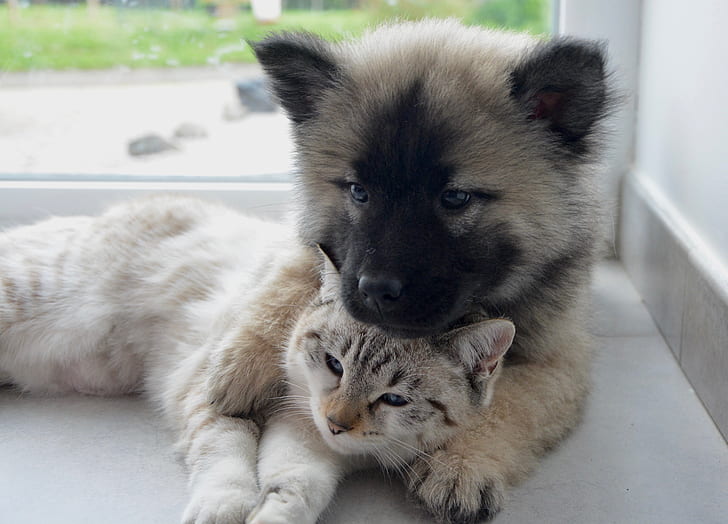Our pets are part of the family, and we love and care for them like our own children. Just like us, our pets are not immune to illness or injury. Visits to the vet are expensive, similar to paying for our doctor’s appointments without health insurance. Keeping their health in check through annual or semi-annual wellness visits can cost hundreds of dollars. Not having the money to save our best friends in the event of illness or an accident would be heartbreaking. Therefore, protecting our beloved pets though pet insurance is definitely worth it.

How Much Will I Spend on My Pet at the Vet? (Without Insurance)
Healthcare is expensive, even for our pets. If you have taken your pet to the vet recently, you know that appointments and medications can easily add up to hundreds of dollars per appointment. In the unfortunate event that your pet needs surgery, the veterinarian bills can be thousands of dollars.
Veterinarian costs sometimes range significantly depending on a variety of factors. Some of these factors include:
- Pet type (dogs usually are more expensive than cats)
- Breed (some breeds are more likely to develop certain health conditions, or are more likely to display aggressive behaviors)
- Size (large dogs tend to be more expensive than smaller dogs)
- Age
- The veterinarian you go to (some are much more expensive than others)
- Location (some states are more expensive than others in general)
- History of pre-existing conditions or hereditary conditions
Average Veterinarian Costs for Cats
Standard costs that most cat owners incur throughout their cat’s life can become quite expensive. Especially neuter and spray packages that you buy upon adopting your new best friend.
- According to Wellness Pet Food, average cost for a wellness exam (including routine testing such as fecal exams) ranges from $90–$200;
- If your cat is diagnosed with, or has already been diagnosed with a condition such as diabetes, wellness visits can be even more expensive.
- According to Forbes, average vaccination costs range $25-$35 per shot
- Average professional dental cleanings are $361.19
- Average price of a neuter package is $254.35 for cats older than 6 months
- Average price of a neuter package is $203.99 for cats younger than 6 months
- Average price of a spray package is $344.74 for cats older than 6 months
- Average price of a spray package is $293.28 for cats younger than 6 months
- Average price is a euthanasia package is $131.28
We can only hope that our pets don’t get sick, become ill, or get into an accident. But unfortunately, your cat will most likely get sick or hurt at some point in their life. Like healthcare for humans, paying for treatments can be very expensive and often unaffordable without insurance. For that reason, investing a small amount of money per month for pet insurance is worth it for cat owners.
Common illnesses and injuries amongst cats and the average costs, according to Forbes:
- Broken bone – $2,300
- Kidney disease – $1,300
- Heart murmur – $1,400
- Diabetes – $1,900
- Arthritis – $500
- Dental disease – $800
- Bladder infection/UTI — $1,100
- Eye conditions – $260
- Ingested foreign objects – $3,400
- Cancer – $3,800
Average Veterinarian Costs for Dogs
Standard costs for owning a dog are typically even more expensive than for cats and can vary quite a bit depending on your dog’s breed. Standard costs for keeping your dog’s health in check is pricy, especially upon adoption.
- Wellness Pet Food estimates that the average costs of wellness visits (including routine testing such as fecal exams) ranges from $200-$400;
- If your dog is diagnosed with, or has already been diagnosed with a condition such as diabetes, wellness visits can be even more expensive.
- According to Forbes, average vaccination costs range from $21–$52 for each shot
- Average professional dental cleanings are $361.19
- Average price of a neuter package is $460.58 for dogs older than 6 months
- Average price of a neuter package is $395.15 for dogs younger than 6 months
- Average price of a spray package is $556.04 for dogs older than 6 months/50 pounds
- Average price of a spray package is $485.51 for dogs younger than 6 months/under 50 pounds
- Average price of a euthanasia package is $131.28
Just like us, it is inevitable that our dogs will sometimes get sick or injured. The costs of paying for unexpected treatments is usually even more expensive than standard veterinarian costs. And like healthcare for humans, many people struggle to afford healthcare or treatments without the help of insurance. Therefore, pet health insurance is worth it to ensure your best friend is protected.
Common illnesses and injuries amongst dogs and the average costs, according to Forbes:
- Broken bone – $2,700
- Heart murmur – $1,200
- Diabetes – $2,700
- Arthritis – $700
- Dental disease – $600
- Bladder infection/UTI – $400
- Eye conditions – $300
- Ingested foreign objects – $3,500
- Cancer – $4,100
Average Savings Through Pet Insurance
Not having enough money to keep your pets healthy, and care for them when they’re injured or ill would heartbreaking. Our pets are part of the family and should be protected like family. Buying them a health insurance plan ensures we can protect them without breaking the bank. Therefore, protecting our beloved pets through pet insurance is definitely worth it.
Pet insurance is not as expensive as you may think, especially compared to the expenses you would incur without it. According to Forbes, the average amount spent on pet insurance per month in 2023 is $44 for dogs and $30 for cats. “That’s for a policy with $5,000 in annual coverage, a $250 deductible and 80% reimbursement level.” That’s a small price to pay when it comes to our family’s healthcare.
What Does Pet Insurance Cover?
Because every animal is unique and special, pet health insurance plans are customizable to cover their specific needs. Because plans are customizable, a good insurance agent will be committed to learning about your pets unique needs to customize your plan accordingly. This will help your agent ensure that your best friends get the coverage they need at a rate you can afford.
If there are conditions that your pet may be prone to, such as a hereditary condition, be sure to speak with an agent to make sure sufficient coverage gets included in your plan. Depending on the insurance plan and company, some products may be offered as add-ons if they are not included as part of a basic plan.
Different Types of Pet Insurance Coverage
As with any insurance plan, there are different types of pet insurance plans, each of which can be customized to make pet insurance worth it for your family. Costs also vary depending on if you are buying coverage for a cat or a dog, dogs being a little more expensive. Additionally, pet health insurance premiums increase at renewal as your pet ages, just like health insurance for humans. As your pet ages, they are more at risk for health issues, just like us.
According to Investopedia, there are four main types of pet insurance coverages.
Comprehensive Coverage / Accident and Illness Coverage
This type of coverage will provide financial support in the event your pet develops an illness or gets hurt in an accident. It covers most illnesses, from common urgent illnesses to common chronic conditions. Coverages that companies commonly include as part a comprehensive plan are:
- Accidental injuries (e.g., broken bones, wounds, bug bites)
- Ingestion of a foreign object or something toxic
- Common illnesses (e.g., infections, influenza, and urinary tract infections)
- Diagnostic services and treatments (e.g., bloodwork, X-rays, surgery)
- Prescription medicine, food, and supplements
- Chronic conditions (e.g., cancer, liver disease, diabetes)
- Behavioral problems (e.g., destructive chewing, excessive licking, anxiety)
- Dental care (e.g., broken teeth, periodontal disease, cysts or tumors in mouth)
- Euthanasia
It is important to note that depending on the insurance plan/provider, this type of coverage does not always cover certain illnesses or services. Be sure to speak with an independent insurance advisor to see if another company offers certain illnesses or services, such as cancer, as part of a comprehensive insurance plan. If not, you may need to buy an additional insurance policy, such as a chronic illnesses policy.
Accident-Only Coverage
This type of coverage includes many types of accidental injuries but does not include illnesses. Types of accidents often included in this policy are:
- Broken bones
- Laceration (deep cuts or tears in the skin)
- Bug bites
- Ingestion of a foreign object or something toxic
- Heat stoke
- Getting hit by a car
Pet Wellness Coverage
Wellness policies are typically bought in addition to a comprehensive or accident policy to help keep up with annual wellness visit costs. “It’s not exactly an insurance product, but a plan that reimburses you at a flat rate for routine checkups and preventive care.” This is a very worthwhile investment though, when you consider how much money it is for annual and semiannual wellness visits. Types of wellness visit services often included in these plans are:
- Wellness exam
- Vaccinations
- Routine diagnostic tests (e.g., blood, fecal, parasite, urinalysis)
- Microchipping
- Dental cleanings
- Deworming
- Flea/tick prevention
- Heartworm prevention
- Spray/Neuter
Other Pet Coverage Options
Not everything you may want coverage for will be covered through the three options listed above. Or maybe you only want coverage for a specific service or condition, rather than buying a comprehensive policy that covers all common accidents and illnesses. For that reason, there are a variety of options that fall under the ‘other’ category that are often added as additional policies.
Typical offers for additional pet health coverage policies:
- Chronic conditions (sometimes included in comprehensive plans, but not always. Sometimes, only some chronic conditions are covered. To ensure your pets get the coverage they need, be sure to speak with your insurance advisor).
- Pre-existing conditions
- Hereditary conditions
- Breeding
- Prescription food
- Dental care
- Senior pets
- Behavioral health / therapy
- End-of-life-care (e.g., Euthanasia, anesthesia, cremation and burial expenses)
- Physical therapy
- Alternative medicine
What Pet Insurance Will Not Cover
Pet insurance plans will cover a lot of products and services that your pet will need to stay happy and healthy. But most insurance plans will not cover just anything.
Conditions and services not typically covered include:
- Grooming
- Cosmetic services
- Pregnancy
- Breeding
- Pre-existing conditions
- Any procedure deemed not medically necessary
Although these items are not typically included in basic pet insurance plans, some may be offered as stand-alone insurance products/other pet insurance options. Pet owners will often buy additional policies to supplement a comprehensive, accident-only, or wellness plan.
TDA Insurance Makes Pet Insurance Worth it for Your Family
TDA Insurance is an independent agency located in the heart of Walled Lake, Michigan. We are a family-owned business committed to protecting the entire state of Michigan. As a family-owned business, we treat our clients like family, which includes their pets! Our independent agents will shop around for you, to ensure your pets are getting the coverage they need at the most affordable price.
Click here to start a FREE pet insurance quote today!
Or for more information, visit our website or contact a TDA agent with any questions or concerns you may have!
